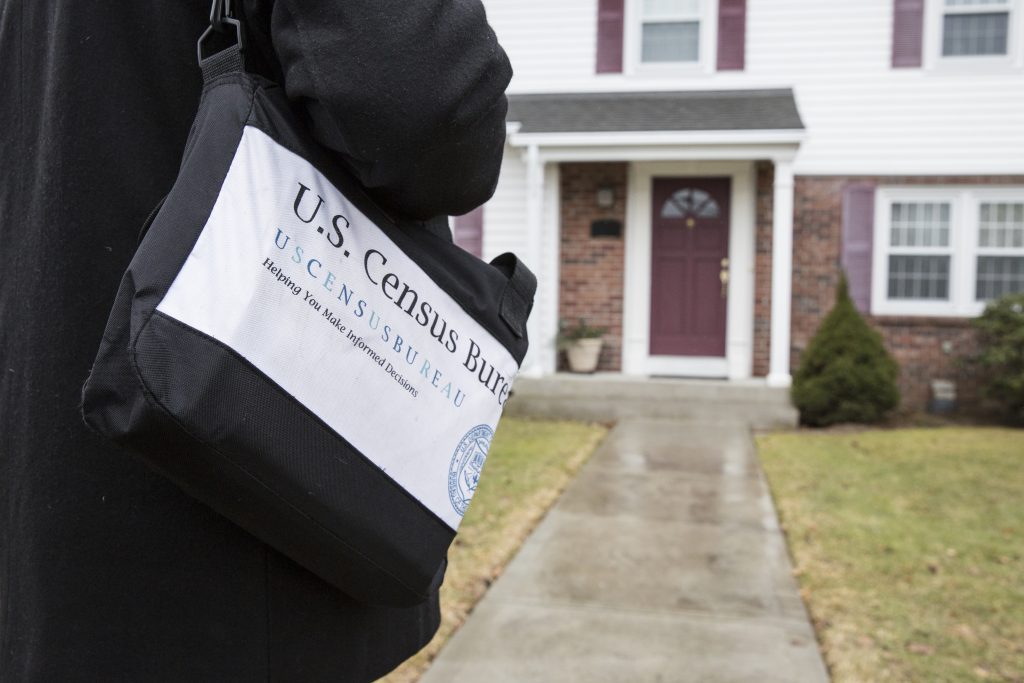Census Bureau, Looking Past Pandemic, Hopes Neighborhood Faces Will Help Open Doors
The U.S. Census is planning to canvass non-respondents in hard-to-reach communities, but is implementing new safety requirements and hiring local canvassers.

The U.S, Census Bureau is suspending its field operations until April because of the coronavirus pandemic.
With billions of dollars’ worth of federal funding at stake, however, the count will go on. The bureau wants people to return its surveys through the mail or over the internet. And it’s also contacting households by phone.
“When it comes to [your] address, your home is sacred.” – Marquita Aldridge, resident
But in Detroit, a high percentage of people don’t have internet subscriptions. And the city has high levels of poverty and many people who rent. That makes it one of the hardest big cities in the U.S. to do a population count.
The bureau always planned to go door-to-door to reach those who had not responded to the census surveys. Except now it’s taking extra safety measures, and it might recruit your neighbor as a trusted face as well.
Click on the player above to hear WDET’s Quinn Klinefelter on how the U.S. Census is adapting to a post-pandemic environment.
Extra Precautions
The head of the bureau, Steven Dillingham, says workers will still knock doors, just not until May at the earliest.
“We still will be using the Census takers to go through the neighborhoods,” Dillingham said. “And we will have a very safe way in which we can still count the people that may not have self-responded.”
The bureau is training workers in how to practice social distancing and providing safety equipment.
But the executive director of Detroit’s 2020 Census campaign, Vicki Kovari, says some Detroiters don’t trust giving out personal information – especially to the federal government.
She believes it may take more than just contacting people safely to convince them to participate.
It may take hearing from someone they identify with.
Familiar Faces
Kovari says trust can built by leveraging existing relationships.
“The Census bureau actually is trying to recruit people to work in their own zip codes,” Kovari said. “It’s absolutely preferable to have people work in those areas where they’re familiar faces.”
Some in Detroit say they’ve heard about the census but have little idea about what it really entails.
That includes Detroit security guard Marquita Aldridge, who admits she knows nothing about the census and feels a bit horrible about that.
But Aldridge says she tries to guard her private affairs as securely as she does City Hall. So she’s not keen about opening up her life to a stranger.
“When it comes to [your] address, your home is sacred,” Aldridge said. “So [I would] definitely be like, ‘I don’t know you and you might be asking a little bit too much personal questions.’”
Fear and Suspicion
Some groups in Metro Detroit have been trying to ease those fears in their own neighborhoods long before Census workers even begin approaching a door.
For instance, Detroit has a large Muslim population. Some imams have been stressing to people in their communities just how much federal funding depends on them taking the census.
“And so I think it’s only natural if you’re an immigrant from those places to be afraid and suspicious of this administration.” – Chris Blauvelt, Islamic Center of Detroit
But Chris Blauvelt of Wayne State University’s Islamic Center of Detroit says some Muslims are reluctant to even register to vote, let alone provide information to census takers, because they fear immigration officials are targeting some in their community for deportation.
“And so I think it’s only natural if you’re an immigrant from those places to be afraid and suspicious of this administration,” he said.
But Blauvelt thinks it would be a bit more reassuring to talk with someone who shares their culture.
“If another Arab American immigrant walked to my door and explained to me that the census is not going to affect you, there’s no risk at all and this will help ensure that our community gets the government aid that we deserve, that obviously means a lot more,” Blauvelt said.
That’s one reason the Census Bureau is actively encouraging people who are bilingual to apply for jobs to go door-to door, once it starts the effort in May.
Census officials say they need people who speak the language of the neighborhoods they’re going to work in.
